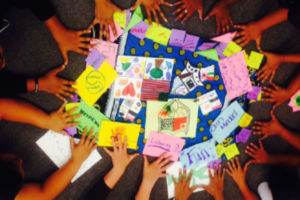Students at Holyoke High School are learning to work through conflicts and other life experiences in a constructive way – a new approach to school discipline that’s morphed into something much more.


Students at Holyoke High School in New Jersey are learning to work through conflicts and other life experiences in a constructive way – a new approach to school discipline that’s morphed into something much more.
The New Jersey school was home to one of the highest suspension rates for Latino students in the nation just five years ago. The state took over the school and officials implemented a new restorative justice discipline program with a focus on transforming student support.
Today, in what was a classroom used for in-school suspensions – where students would sit silently in rowed desks – there’s a circle of chairs, ongoing service projects, and students meeting in one-on-one sessions with counselors, New England Public Radio reports.
The program is called Pa’lante – a term used in Puerto Rico which means “moving forward” – and it’s designed and led by the students themselves, many of whom first learned about the group through disciplinary problems.
“We did the research on what actually benefits students,” senior Stephanie Duque said. “You know, we’re humans, we need to be supported in different ways.”
NEPR reports:
There’s a lot going on at Pa’lante. First there are the peer leaders—a strongly-bonded group of 25 students who meet numerous times a week. Then there are the “action research” projects these students engage in every year, like the one that led to changes in the student support room. And finally there’s “circle practice,” a mode of conflict resolution facilitated by peer leaders for other students, and even teachers.
The program has the backing of district officials, who plan to expand the restorative justice approach to other schools. Union officials also support the concept, but note it’s been unable to fully address Holyoke’s student discipline problems.
Regardless, Pa’lante students are convinced the student-led initiative is moving things in the right direction, while also sending an important message.
“For me it’s a counter-narrative,” said senior Vianca Gonzalez, who has served as a peer leader over the last three years. “Because the dominant narrative is, people from Holyoke: drug dealers, pregnancies, drop-out. And Pa’lante is providing this outlet for us where we can show people that being Latinos from Holyoke we’re not who they think we are, and we’re going to prove them wrong.”
James Davison Hunter, founder of the Institute for Advanced Studies in Culture, discusses in his book “The Death of Character” how effective character education encourages students to engage shared values through school and community life.
Advocates of the new and improved character education pedagogies end up with an unequivocal affirmation of moral content in the advocacy of values. They generally agree that young people should be required to engage these values through the habits and challenges of basic life experience, especially when these ideals and practices are integrated in the entire life of the school and in the fabric of the larger community.
The Pa’lante Restorative Justice website goes into more details about “indigenous circle practice,” “youth participatory action research,” and other practices the program uses “to build youth power, center student voice, and organize for school discipline and educational policies and practices that actively dismantle the school to prison pipeline in Holyoke and beyond.”